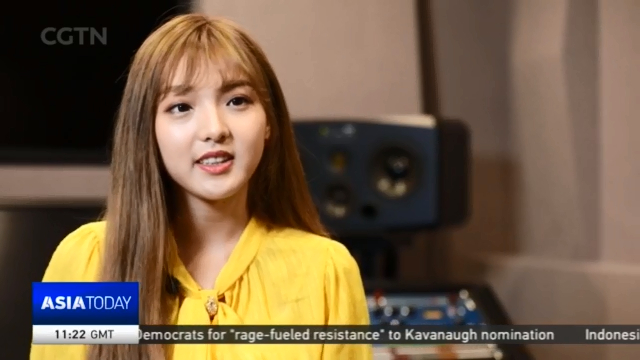
19:45, 05-Oct-2018
Idol-Making Industry: Hit S. Korea talent show stimulates Chinese idol-making market
Updated
19:33, 08-Oct-2018
03:30

A Chinese remake of the hit South Korean idol-making reality show has attracted countless fans and investors in China's burgeoning entertainment market. Industry experts say there's still much to be done before China's idol-industry outgrows the influence of Korean and Japanese pop culture. Today, Ren Xueqian takes a look at how the Chinese idol-industry is trying to catch up.
According to online entertainment data, the Chinese version of the popular South Korean talent show, "Produce 101" received nearly 5 billion views between mid-April to mid-June .
Backed by China's mega tech firm Tencent Holding, over 13-thousand contestants or "idol trainees" from hundreds of management companies auditioned for the show. But only 101 trainees were selected to compete for the wining spots.
And the competition was fierce.
QIANG DONGYUE "PRODUCE 101" CHINA CONTESTANT "I wanted to make it as one of the 11 finalists so I can debut with a girl group. I didn't want to miss this opportunity."
To debut through the show meant that the trainees would have to sing, dance, be creative and most of all, look fabulous while mastering all three simultaneously in front of millions of viewers. With expectations high, the pressure increased as the show went on.
WANG JU "PRODUCE 101" CHINA CONTESTANT "We had closed practices when we taped for the show, all electronic devices were taken away. I was so overwhelmed with stress once I ran to a corner and just cried. I wasn't upset but I needed to release all the tension."
And the stress wasn't just on the trainees.
Offscreen, their management teams made sure they were prepared for battle.
SUN RUIMING ARTIST DIRECTOR, BANANA CULTURE ENTERTAINMENT "The trainees practice 12 hours every day. And they have to work overtime to finish assignments given by their trainers. There's also a weekly 16-hour training session. That's the way it is, because being an idol means being able to sing and dance, it's all about stage presence."
The more the trainees perfected their skills, the more they became like their Korean counterparts whose pop culture style has dominated East Asia.
SUN RUIMING ARTIST DIRECTOR, BANANA CULTURE ENTERTAINMENT "The idea of an 'idol' originated from South Korea, so it's normal for young idols in China to have that k-pop undertone. We think multi-faceted idols can be created through the South Korean and Japanese trainee production model."
And experts agree that such training methods can be used to help stimulate China's idol-producing industry, and think that the model can also be used to maintain new artists' popularity in the long run.
CHEN YUETIAN PARTNER, SEA OF STARS CAPITAL"Japan and South Korea have these music shows for new idols' to show off their work. It's a great way to maintain consistent exposure, attract more viewers and make money."
And according to a data analysis company in Beijing, change is already underway to improve China's idol production model.
CAO YONGSHOU PRESIDENT, BEIJING AIMAN DATA TECHNOLOGY "Once the industry grows to a certain scale, and with China's large population, it's possible and not hard for China to build its own idol production model."
REN XUEQIAN CGTN "As the Chinese idol-making industry slowly catches up with its neighbour, experts believe China is becoming more equipped with the knowledge to actively produce and promote talent show idols and the industry can only get bigger with time. RXQ, CGTN."

SITEMAP
Copyright © 2018 CGTN. Beijing ICP prepared NO.16065310-3
Copyright © 2018 CGTN. Beijing ICP prepared NO.16065310-3